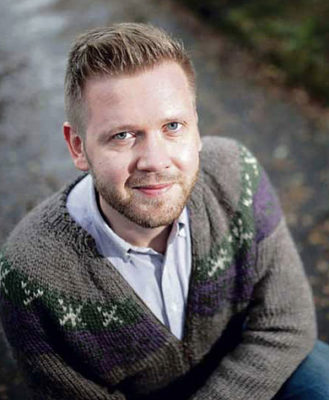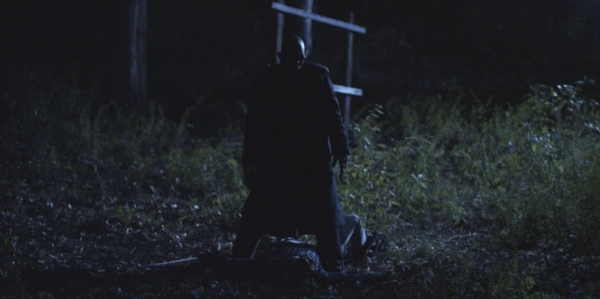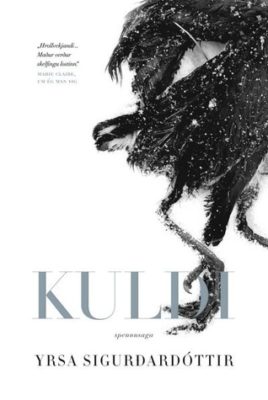 Name: Erlingur Thoroddsen
Name: Erlingur Thoroddsen
Age: 35
Birthplace: Reykjavik, Iceland
Sexuality: Gay
Notable films:Child Eater (2016), Rift (2017)
When did you know you were queer? When did you come out?
Erlingur Thoroddsen: I was about 12 when I realized that I liked boys more than I liked girls, but looking back there were definitely moments earlier in my life when it should have been obvious. But at the same time, most kids don’t really think about their sexuality until they reach puberty, so it makes sense that that’s the age when this realization happens.
I was 17 when I came out, and it was a long drawn-out process. I would tell a couple of friends and then wait a few weeks and tell some other friends. This went on for a year or so until I told my parents. Everyone was amazing and supportive — afterwards my family would walk with me in the Reykjavik Pride parade, and they still go every year even if I’m not around.
Iceland is very progressive and open-minded in general, so there was really no reason for me to be afraid of coming out, but at the same time I would always imagine the worst case scenarios. I guess that is the price you pay for having an hyperactive imagination.
How did you get into filmmaking?
ET: I was always fascinated with movies from a very early age. As a kid, I would much rather stay inside and watch TV than go outside and play. At a certain point I realized that there are actually people who make the movies and from there on, there was no stopping me. Initially, I wanted to be an actor because young me thought that the actors made the movies themselves (I was admittedly kind of a terrible actor).
Once I learned about the concept of writers and directors, everything changed. I must have been about ten years old when I started shooting home-made horror movies on my dad’s old mini-VHS camera. Over the years, those little shorts kept getting bigger and more ambitious, and in my twenties I decided to spend all my savings on going to film school in America – having grown up on American films, that seemed to make the most sense. I got accepted in the Columbia University film program and haven’t really looked back since!

Rift (2017)
Why do you make horror films?
ET: Horror is also something I gravitated towards very early. I think it was a mix of being tempted by the unknown and forbidden – and also a little masochistic appetite for fear. I was obsessed with horror VHS covers long before I was allowed to watch the movies, and I made my mom tell me the plots of the scary films she had seen. By hearing her plot descriptions and having seen key images from the VHS boxes, I was already making up movies in my head when I was very little.
The first two horror films I remember watching were Freddy’s Dead: The Final Nightmare (which got me obsessed with Freddy Krueger) and Aliens (which got me obsessed with that franchise), when I was seven years old. They both scared me to death. It was a feeling I kept wanting to come back to.
I think a part of the reason that I make horror films is a desire to replicate those emotions both for myself and for an audience. Horror also allows you to use interesting visual metaphors and explore societal themes without the burden of being “realistic” like a lot of other genres would require. In horror, everything goes, which is a very liberating thing creatively speaking.
What films (queer or not) have made a significant impact on you and your work? In what way?
ET: I could name so many, so I’ll stick with some of the highlights. I had a big Italian-horror movie obsession for years. For example, Dario Argento’s Suspiria and Profondo Rosso (Deep Red) made me realize how the camera can act as an active participant in telling the story, not bound to any of the characters necessarily. Brian De Palma is also a big influence for me, specifically his lurid thrillers like Dressed to Kill. I just love the passion and visual flare that’s on display. These are filmmakers that really deal in creating sensational moments that impact you viscerally and emotionally (maybe a little less emotionally in Argento’s case).
Some other horror titles that impacted me: Scream was like an encyclopedia of horror for me (it’s still one of my favorite films of all time). A Nightmare on Elm Street is the scariest film I’ve ever seen and Freddy Krueger will always be my #1 villain. The Innocents has perfect atmosphere and tension; it’s also one of the most beautiful films of all times. Vertigo is my favorite Hitchcock and really made me appreciate how mysteries with no easy solutions can make a movie stick with you forever (see also: Don’t Look Now, Mulholland Drive, Picnic at Hanging Rock). These are all films that about the journey, not the conclusion.
I’m leaving out so many things I love, but if it was directed by Verhoeven, Bergman, Spielberg, Tarkovsky or Carpenter, chances are that I stan.
(Also, Aliens because it is perfectly structured and probably the film I’ve seen the most.)

Child Eater (2016)
You’re an Icelandic filmmaker, so your experiences getting films off the ground may be completely different from other directors in this showcase. How progressive or welcoming do you think the industry is for queer creators right now?
ET: I can only speak from my own experiences as a white gay director, and from what I have heard anecdotally from others, but my sense is that there is definitely an industry-wide desire to make queer movies and TV. The problem is, I think a lot of studios don’t really know *what kind* of queer movies they want to make. I’ve heard from people who go in to pitch something that features gay protagonists and the feedback they get is that it’s “too gay” or that their ideas are somehow not relatable enough for a broad audience. Basically there’s a suggestion that there is a right kind of queer content and a wrong kind of queer content.
I think the studios are torn between wanting to be progressive and “with the times,” but not really knowing what that means. For a lot of them, the idea of “queer” seems to be very clean-cut and mainstream.
They are thinking about what will sell and that’s a hard thing to figure out because there’s not a lot of studio-level examples they can look at (although, this seems to be changing a lot more rapidly in TV). Most overtly queer horror films are made in the indie or foreign space. The horror community rallies around those films but in terms of financial success, they might not be the examples to inspire confidence in studio execs. So it’s this Catch 22 situation where there’s a desire to do something, but also a lot of fear about it at the same time.
Rift feels like a very personal film. How informed by your own experiences was the narrative of that film? Does your sexuality play a part in your filmmaking practice normally?
ET: It was very much informed by my own experiences. When I started writing it, I had just gone through a breakup and was stuck in a prolonged “dark night of the soul” period. I had a lot of stuff on my mind: about how loving someone doesn’t mean you should be with them; co-dependency; how two people who share a moment might have very different memories of that moment. Stuff like that.
At the same time I felt frustrated that I didn’t have a second feature in the pipeline, so I decided I would just make something on my own. I figured I could do a film inexpensively if I had two actors in one cabin and it made sense to take all the things I had on my mind and have those characters explore them. Writing the script was basically a long therapy session for me.
Overall, I think my sexuality definitely plays a part in my creative process. It’s a big part of who I am and the community I spend the most time with, so I think it is only normal that it finds its way into my work. Sometimes it happens in overt ways, and sometimes it’s more subtextual. I try not to question my creative impulses too much. Once I have good idea, I like to run with it and see where it takes me. I feel like most of the stuff I write or come up with has a queer component in one way or another, but I also don’t like to force anything into a story if it doesn’t feel right. It all depends on the project.
That said, I generally feel that a queer element makes what I’m watching at least 20% more interesting.
Do you subscribe to queer readings of your films?
ET: Absolutely! Before film, my background was in comparative literature, so basically I will subscribe to any reading of my films as long as the text warrants it and/or the critic makes a compelling argument.
And it’s kind of easy for my films. I’ve made two features so far, one of which is all about a disintegrated gay relationship and the other one is about an imaginative little boy who is terrorized by a monster in his closet…
Wonder where that comes from…
Have you interacted with many queer horror fans of your films? What has that experience been like?
ET:A little bit, yeah. I was fortunate enough to get to travel around the world with Rift when it did the festival circuit and I met a lot of people who were really taken by the movie. I think its themes are universal and people who have gone through hard breakups really relate to it, queer or not – although I do think there is something in that film that specifically speaks to gay men. I’ve also seen a lot of love online, as well as deep-dives and close readings into the film that have impressed me quite a bit.
It’s really rewarding and humbling for me that people want to talk about the film at all, let alone with so much passion. I love it.

Kuldi (Cold)
I’m both excited and nervous about word of an American remake of Rift. How involved will you be on that? And what else do you have on your plate?
ET: There is no need to be nervous! I am definitely involved and have been developing a script for the new version with Orion Pictures, which has been an amazing experience. It’s a story that is too close to my heart for me to give it up completely to someone else.
I can’t say too much about it at the moment other than it is still going to be very queer and scary — probably even scarier! I really couldn’t be more excited about where we are taking it.
Everyone involved is a big fan of the original film so I feel like I’m in great hands. I can’t wait to give you more info, but I have to keep tight-lipped for now!
Otherwise, I’ve got a few other things on my plate, one of which is an adaptation of a fantastic Icelandic bestseller called Cold (Kuldi in Icelandic). It’s a mystery thriller with some spooky elements and some mind blowing twists. It’s really fun and will let me explore some of my Hitchcock/De Palma fetishes a bit more. The idea is to shoot it this coming winter, so that and Rift are keeping me plenty busy at the moment.
Follow Erlingur on social media: